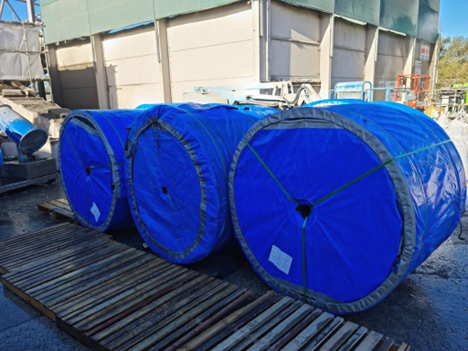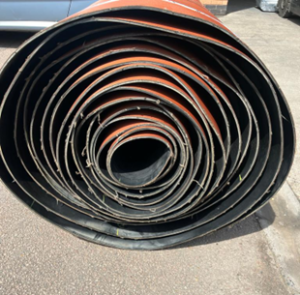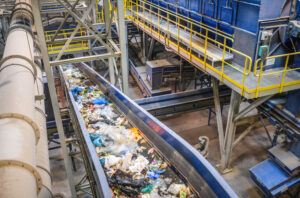Tackling Carryback, Blockages and Spillages.
Materials Recycling Facilities (MRFs) stand at the forefront of our journey toward a sustainable future, ensuring waste reduction and resource conservation. At the heart of these facilities lie conveyor belts, facilitating a smooth recycling process. Yet, the upkeep and operational efficiency of these belts pose recurrent challenges, especially in the face of persistent issues like carryback, blockages, and spillages. This blog highlights the value of maintaining clean conveyor belts and highlights the pitfalls of carryback, spillages, and blockages.
Clean conveyor belts are essential for maintaining the quality of recycled materials. Accumulated debris and dirt can contaminate the materials being conveyed, creating problems for their usability and market value. Recycling plants deliver high-quality, uncontaminated materials to downstream processes and end-users by keeping conveyor belts clean.
Improved Efficiency:
Efficiency is paramount across Materials Recycling Facilities. When conveyor belts are clean, they run smoothly and efficiently, reducing unnecessary downtime and optimising the facility’s overall productivity. Clean conveyor belts minimise energy consumption and help streamline recycling by preventing material build-up and reducing friction.
Minimised Equipment Wear and Tear:
Accumulated debris and particles on conveyor belts can cause excessive wear and tear on equipment. Abrasive materials can erode the surface of belts, pulleys, and other components, leading to premature failure and costly repairs. Regular cleaning of conveyor belts helps extend their lifespan and reduces maintenance expenses.
The Consequences of Carryback & Spillage on Conveyor Belts
Carryback refers to the residual material that adheres to the surface of conveyor belts, subsequently falling off as it returns along the return side. Carryback poses several significant problems:
Material Loss and Inefficiency:
Carryback results in the loss of valuable recycled materials, impacting both recycling plants’ revenue and sustainability goals. It also contributes to material inefficiency by reducing the plant’s overall throughput. Regular cleaning and maintenance of conveyor belts can significantly reduce carryback, ensuring minimal material loss and maximum efficiency.
Environmental, Health & Safety Concerns:
The material that accumulates due to carryback can spill onto the plant floor or nearby areas, creating safety hazards for workers and the environment. Slips, trips, and falls can occur due to the presence of loose materials, leading to injuries. Furthermore, carryback that escapes the surrounding environment can contaminate soil, water sources, and air quality. A clean conveyor belt helps mitigate these risks, ensuring a safer and more eco-friendly work environment.
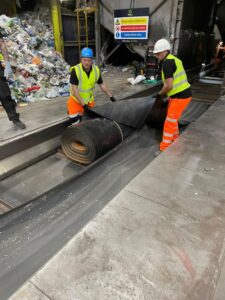
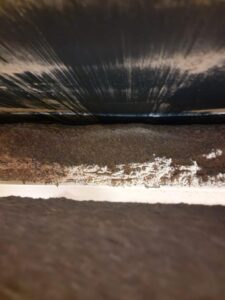
The Impact of Blockages
Blockages, which occur when materials get lodged or jammed in conveyor systems, can have severe consequences for materials recycling plants:
Production Delays and Downtime:
Blockages halt the movement of materials, resulting in production delays and costly downtime. The interruption of material flow disrupts the entire recycling process and hampers the plant’s ability to meet production/recycling tonnage targets. Regular monitoring, maintenance, and prompt removal of blockages are essential to minimise disruptions and maintain operational efficiency.
Increased Maintenance Costs:
Blockages can cause damage to conveyor belts and associated equipment, leading to increased maintenance and repair costs. Clearing blockages requires manual intervention, consuming valuable time and labour resources. By implementing preventive measures such as conveyor belt cleaners and scrapers, routine inspections and effective material handling procedures, recycling plants can mitigate the occurrence of blockages and reduce maintenance expenses.
Conclusion on keeping conveyor belts clean…
In materials recycling plants, conveyor belts play a critical role in ensuring the efficient and seamless movement of materials throughout the recycling process. The significance of keeping conveyor belts clean and operational cannot be overstated. By addressing challenges like carryback and blockages, recycling plants can enhance material quality, improve operational efficiency, minimise equipment wear and tear, and promote a safer and more sustainable work environment. Regular cleaning, maintenance, and proactive measures are vital in harnessing the full potential of conveyor belts and achieving the goals of a greener, circular economy.
Contact us today to learn more about our range of conveyor belts, conveyor belt cleaners and scrapers and our motorised brush cleaning system for conveyors.
Hoverdale is proud to be a member of Made in Britain

